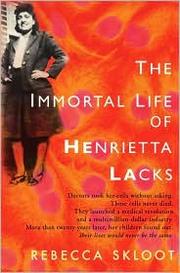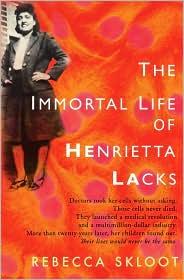Check nearby libraries
Buy this book

Her name was Henrietta Lacks, but scientists know her as HeLa. She was a poor Southern tobacco farmer, yet her cells--taken without her knowledge--became one of the most important tools in medicine. The first "immortal" human cells grown in culture, they are still alive today, though she has been dead for more than sixty years. HeLa cells were vital for developing the polio vaccine; uncovered secrets of cancer and viruses; helped lead to in vitro fertilization, cloning, and gene mapping; and have been bought and sold by the billions. Yet Henrietta Lacks is buried in an unmarked grave. Her family did not learn of her "immortality" until more than twenty years after her death, when scientists began using her husband and children in research without informed consent. The story of the Lacks family is inextricably connected to the dark history of experimentation on African Americans, the birth of bioethics, and the legal battles over whether we control the stuff we are made of--From publisher description.
Check nearby libraries
Buy this book

Previews available in: English
Subjects
Cancer, Cell culture, Research, Patients, Health, HeLa cells, African American women, Medical ethics, Human experimentation in medicine, Biography, History, Lacks, Henrietta, -- 1920-1951 -- Health, Cancer -- Patients -- Virginia -- Biography, African American women -- History, Human experimentation in medicine -- United States -- History, Cancer -- Research, Health and hygiene, Tissue Donors, Patienter, Forskning, Cancerpatienter, Zellkultur, History, 20th Century, Historia, Medicinska experiment på människor, Ethics, Cellodling, African Americans, Afro-amerikanskor, Medicinsk teknik, Cells, Medicinhistoria, Prejudice, Hälsa, HeLa-Zelle, Human Experimentation, Confidentiality, Etik, MEDICAL / Ethics, Tissue and Organ Procurement, Medizinische Ethik, Cytologie, Afro-amerikanska kvinnor, medicine, science, cervical cancer, radiation, effects of radiation, polio, vaccination, Biography & Autobiography, Nonfiction, Sociology, New York Times bestseller, nyt:combined_print_nonfiction=2012-03-03, MEDICAL, University of South Alabama, Reading Level-Grade 11, Reading Level-Grade 12, Cancer, patients, biography, Cancer, research, Human experimentation in medicine, history, African americans, biography, Large type books, New York Times reviewed, Medical (incl. Patients), Cultural, Ethnic & Regional, General, HEALTH & FITNESS, Diseases, 44.01 history of medicine, 44.02 philosophy and ethics of medicine, Bioethics, Blacks, Human genetics, Neoplasms, Translational Medical Research, Informed Consent, Research Ethics, Cell Line, SOCIAL SCIENCE, HeLa-cellen, Bio-ethiek, Zwarten, Antropogenetica, Universidad Sergio ArboledaPlaces
United States, Förenta staterna, USA, VirginiaShowing 5 featured editions. View all 25 editions?
| Edition | Availability |
|---|---|
|
1
The Immortal Life of Henrietta Lacks
2011, Broadway Paperbacks
Paperback
in English
1400052181 9781400052189
|
eeee
|
| 2 |
eeee
|
|
3
The immortal life of Henriette Lacks
2010, Thorndike Press
in English
- Large print ed.
1410427927 9781410427922
|
cccc
|
| 4 |
aaaa
|
|
5
The Immortal Life of Henrietta Lacks [Paperback] [Jan 07, 2011] Rebecca Skloot
Publish date unknown, PAN MACMILLAN U.K
paperback
1509854428 9781509854424
|
eeee
|
Book Details
Edition Notes
Includes bibliographical references and index.
Classifications
The Physical Object
Edition Identifiers
Work Identifiers
Source records
- Library of Congress MARC record
- marc_openlibraries_phillipsacademy MARC record
- Internet Archive item record
- Internet Archive item record
- Internet Archive item record
- marc_openlibraries_sanfranciscopubliclibrary MARC record
- Marygrove College MARC record
- Library of Congress MARC record
- Internet Archive item record
- marc_scms MARC record
- marc_columbia MARC record
- Better World Books record
- marc_columbia MARC record
- Harvard University record
- marc_nuls MARC record
- ISBNdb
- midcolumbia:1110565 record
- Harvard University record
Work Description
Her name was Henrietta Lacks, but scientists know her as HeLa. She was a poor black tobacco farmer whose cells—taken without her knowledge in 1951—became one of the most important tools in medicine, vital for developing the polio vaccine, cloning, gene mapping, in vitro fertilization, and more. Henrietta’s cells have been bought and sold by the billions, yet she remains virtually unknown, and her family can’t afford health insurance.
This New York Times bestseller takes readers on an extraordinary journey, from the “colored” ward of Johns Hopkins Hospital in the 1950s to stark white laboratories with freezers filled with HeLa cells, from Henrietta’s small, dying hometown of Clover, Virginia, to East Baltimore today, where her children and grandchildren live and struggle with the legacy of her cells. The Immortal Life of Henrietta Lacks tells a riveting story of the collision between ethics, race, and medicine; of scientific discovery and faith healing; and of a daughter consumed with questions about the mother she never knew. It’s a story inextricably connected to the dark history of experimentation on African Americans, the birth of bioethics, and the legal battles over whether we control the stuff we’re made of.
(source)
Excerpts
first sentence
Links outside Open Library
Community Reviews (0)
History
- Created December 31, 2009
- 24 revisions
Wikipedia citation
×CloseCopy and paste this code into your Wikipedia page. Need help?
| May 16, 2025 | Edited by MARC Bot | import existing book |
| March 10, 2025 | Edited by Mek | updates midcolumbia:1110565 with lexile |
| December 20, 2023 | Edited by ImportBot | import existing book |
| March 7, 2023 | Edited by MARC Bot | import existing book |
| December 31, 2009 | Created by ImportBot | Imported from Library of Congress MARC record |













![Cover of: The Immortal Life of Henrietta Lacks [Paperback] [Jan 07, 2011] Rebecca Skloot Cover of: The Immortal Life of Henrietta Lacks [Paperback] [Jan 07, 2011] Rebecca Skloot](http://covers.openlibrary.org/b/id/10081300-S.jpg)